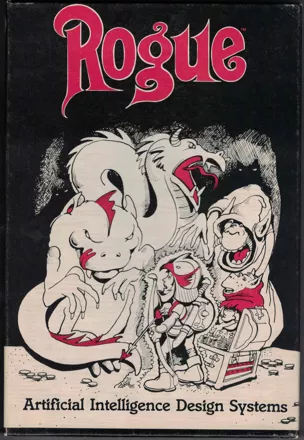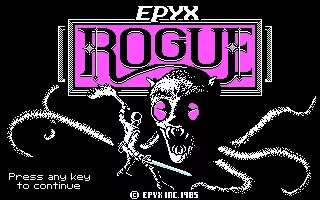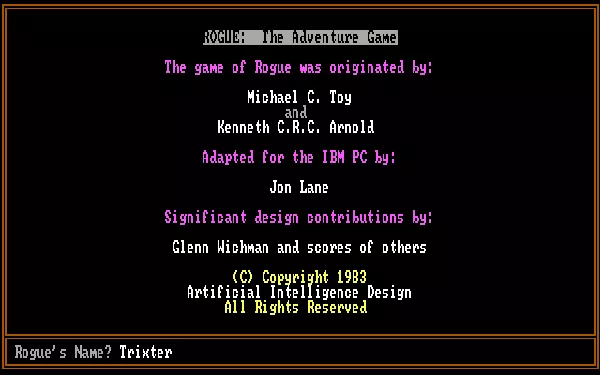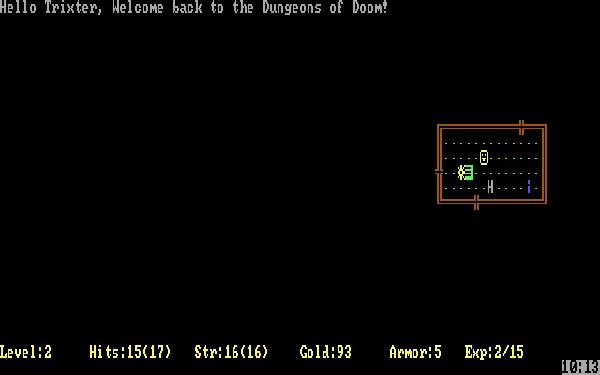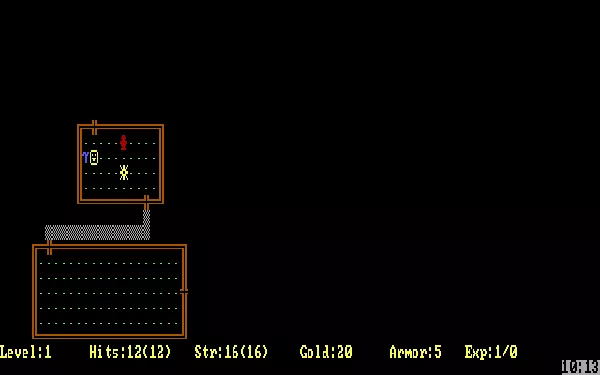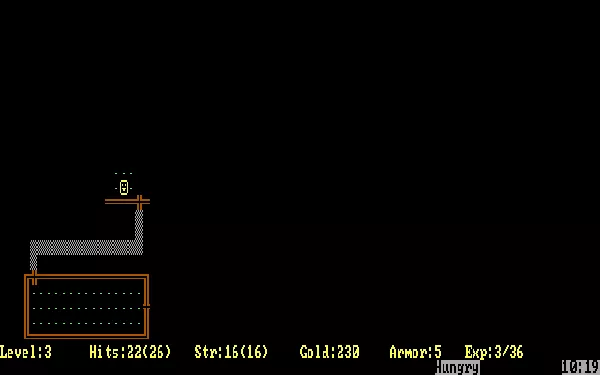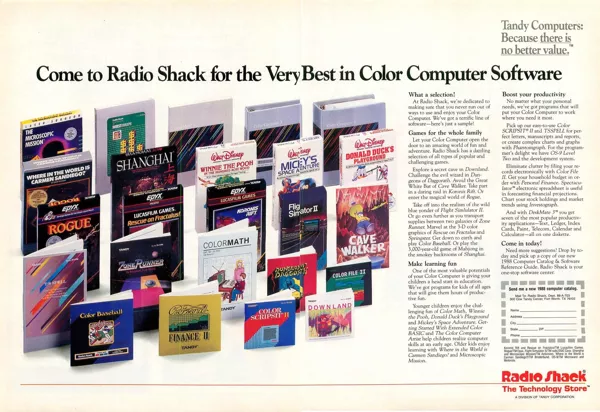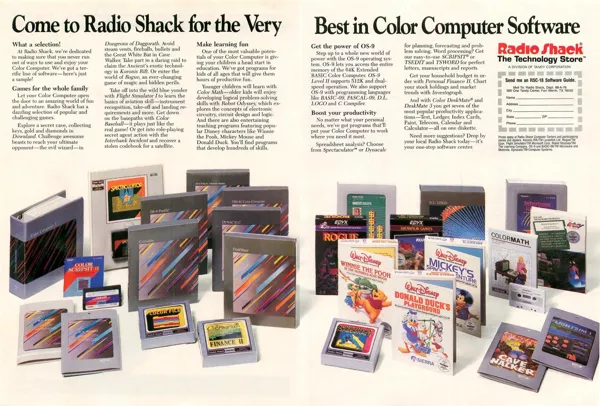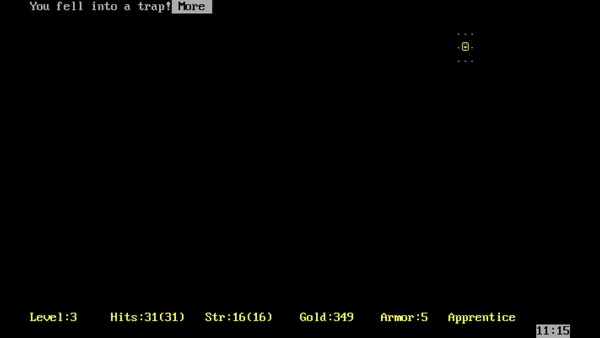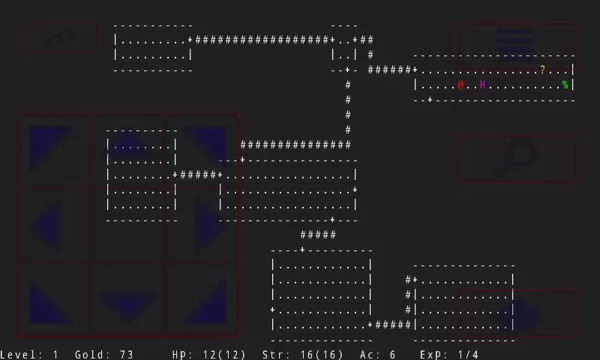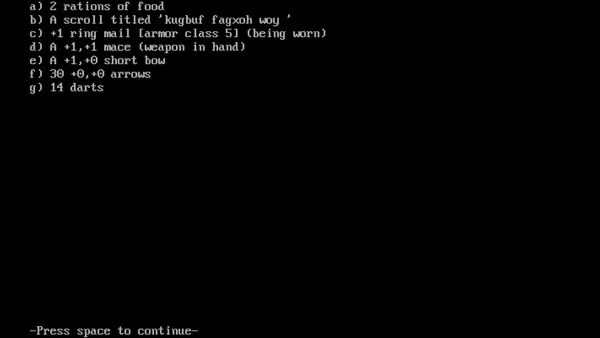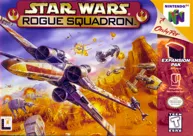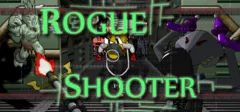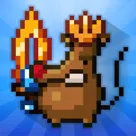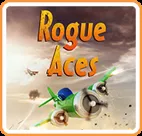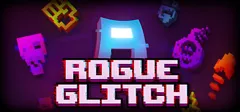Rogue
Description official descriptions
Rogue is a turn-based dungeon crawler in which the player controls an adventurer who must explore the dangerous Dungeon of Doom in order to retrieve the precious Amulet of Yendor and make it out alive. The player character starts on the upper-most level and slowly makes his way downwards.
The game uses ASCII characters to represent locations, items, monsters, and the protagonist himself. There are twenty-six different types of monsters, symbolized by their initial letters (e.g. L for Leprechaun). Monsters have different abilities and modes of attack. The dungeon and the items in it are randomly generated each time the player begins a new game. Each dungeon level contains a grid of three by three rooms and dead ends.
Levels get progressively more complex and maze-like, and monsters grow in strength the deeper the hero ventures into the dungeon. The player character can acquire better weapons and armor, gain experience points and level up. Should the protagonist perish in the dungeon, the player must restart the game anew.
Spellings
- ローグ - Japanese spelling
Groups +
Screenshots
Promos
Credits (DOS version)
19 People (5 developers, 14 thanks)
| Original Concept | |
| Adapted for the IBM PC by | |
| Significant design contributions by | |
| A Guide to Dungeons of Doom by | |
| Special Thanks |
|
| Public domain version of Rogue written by |
Reviews
Critics
Average score: 53% (based on 9 ratings)
Players
Average score: 3.3 out of 5 (based on 70 ratings with 7 reviews)
Ahhh. The quest for the... What Am I Searching for again?
The Good
Ahh, Rogue. The name alone brings forth memories of sitting in front of my 8088 PS/2 and wildly tapping the keys battling Aquators, Phantoms and Kestrals.
This game is great. One of the first real "graphic" adventures, it was a giant step forward from Infocom Interactive fiction. This game was also the granddaddy of "randomly generated" games, such as Nethack, that very few current games have yet to match.
The gameplay is very very simple. You start out entering the "Dungeons of Doom", and need to progress down through the dungeon to the 26th level to retrieve the Orb. Along the way you'll pick up magical blades, strange scrolls, wands, rings, staves, and food. You're character is portrayed by good ol SMILEY FACE. All the Monsters are represented by the letters A-Z (although you can't see "P", because P stands for Phantom and Phantoms are invisible :) You fight and move using the keypad, and you can pick up and drop items that you find during your adventure.
Being that Rogue: The Adventure Game randomly creates the dungeon as you progress through the game, it also randomly names spells. So if an enchant armore spell is "vof wifan que" in one game, you can be ABSOLUTELY POSITIVE it won't be the same the next time you play. Same goes with wands and potions. Wand types (i.e. silver, molybdenum, gold) and Potion types (green, turquiose, plaid) will also be different each time you play. So note-taking will have NO effect except if you take notes on the different ITEMS found in the game, not the descriptions.
The graphics are ANSI style graphics. Therefore, the best you would get is 16 colors and the entire ASCII extended character base to work from. Fortunately, the extended ASCII set has characters that look like walls, and the Monsters are provided by the Alphabet. The game will run on any PC, even PC's running Windows 98 (a miracle in itself)
The only sound available in 1983 was the good old PC speaker, and It just bleeped.
Control is very easy. The numeric keypad moves your character, and also attacks in the direction you press. Can't get any simpler than that. :)
The Bad
The game, although deceptively easy, is tough. I mean TOUGH. I have never reached the 26th level (so for me it is mere rumor... I believe that it goes as far down as the game want you to get :) so I have never recovered the orb.
Because of the game randomness, I've been killed on level 2 due to a lucky hit from a Hobgoblin, but I've also ventured to the 10th level only to be killed of by starvation.
Starvation sucks. Pure and simple. It's a matter of randomness if you get a lot of food or if you are continually fainting.
The Bottom Line
So to sum up the above review... It's random. It all depends on what the program gives you, that will determine how far you get in the game.
It's a fantastic game, don't get me wrong. You just have to catch the right time to play it. It all depends on the randomness :)
DOS · by Chris Martin (1155) · 2000
They say that simplicity is the key to perfection...
The Good
...and they are probably right. The game's graphics and colours are absolutely basic and so is the concept, but somehow it manages to capture the essence of dungeon crawling. Exploring the dark hallways and underground chambers, one step at a time, dreading the next monster that waits around the corner, discovering treasure and valuable items, navigating traps and pitfalls and finally seeing that precious staircase that leads even deeper into darkness...
The Bad
What is there not to like? If one is really a slave to visuals and surround sound, this game hasn't much to offer. The only thing that's probably truly lacking is some kind of story and dialogue, but this is not the focus of the game and it would probably just dilute the experience.
The Bottom Line
This is the very first CRPG I played back in 1989, on my brand-new PC-XT machine which was running at the incredible speed of 8 Mhz. But this was the game that truly introduced me to the concept of RPGs in general and I was instantly taken by it. Even if you can't stand the ancient graphics, force yourself to sit down for a couple of levels and there is a good chance you will have finished half a dozen before you know what happened.
DOS · by Silverblade (1382) · 2004
And to think I played this game in 2003...
The Good
Well, as I played this game 2 decades after this game was released, it seems that I can objectively review this game without my usual subjective opinion...hahaha.
Anyway, this is one very cute game. Simple if not prehistoric in the graphics department which is very nice considering. To my surprise, the game is still playable, this is one of those 'rare games' that don't seem to be affected to much by the course of technology. Unless you're on of those 'graphic oriented' people (sigh).
A very simple concept. Your stuck in a dungeon - Fight your way out. During your journeys you will be assisted by random items and pursued by random monsters. The more monsters you whack, the higher your experience and level, the better prepared you are for lower levels filled with more powerful monsters.
The graphics in this game is very similar to games like Star Fleet, of which I don't know if there is a specific terminology used to describe graphics based on letters and numbers. But the developers portrayed the game very well to get that 'dungeon' kind of feel.
The game is completely playable. Each time you play, its a new game. Like a game of chess or cards. Every time its a new game. The random setting of this game is both refreshing (not likely to get bored) and irritating (if you end up with a lousy map and lousy random items).
A strange thing in this game, is that mostly everything is random. From the map to the items. Only the monsters don't seem be random. The items spesifically have random uses. So the first time you come across a Blue Potion for instance, it may be a healing potion. The next time around (a new game) it may be a Sleeping Potion. So not much use in writing item descriptions down.
The Bad
I always like a game that used the keyboard to the maximum length. Meaning that most of the keyboard keys were used. This game introduced a similar concept, however it's quite confusing if you press a key and not sure if it works or not. For example, the search key (S) is used to search for hidden doors, etc. But there is no description if it doesn't work (if there happens to be a secret door). Basically some simple text to tell you what's going on would be nice.
Speaking of some simple text, this game lacks description. Its a fun simple game. But to simple in my opinion. For example, you found this longsword and you find this two-handed sword. Let's say you don't know anything about swords. How do you know which one is better? In this game, you don't. You could (for example) go around using that straw staff, thinking its better than the Magical Platinum Sword with Flame Thrower special attack :p
There are only 2 ways to know what (spesifically) a magic item is for. One, use with a possibility of still not knowing what it does (usually scrolls). Two, use an Identity Scroll. But you don't find many of those either. Basically, you probably wouldn't know what half of the stuff your carrying is for. (Hmmm...carrot...what's a carrot? Nevermind).
I often wonder what code is used for combat. Sometimes I just don't get the fact that after reaching level 7, I can still miss that !@#!@# level 1 Bat 5 times. Irritating really.
The Bottom Line
Overall, this game to my opinion stood the test of time. And more refreshing than playing Solitaire. Hahaha. This game is all about pure luck.
DOS · by Indra was here (20756) · 2004
Discussion
| Subject | By | Date |
|---|---|---|
| Rogue in AUUG Newsletter Sept. '82 (Australian Unix Users Group) | Andrew Fisher (697) | May 10, 2023 |
| Game Group: Rogue Variants? | PCGamer77 (3158) | Jun 7, 2021 |
| Amiga version of Rogue for PC | Ardor | Mar 2, 2009 |
| Game port listing needs to be removed? | LepricahnsGold (142748) | Dec 13, 2008 |
| Public Domain or Commercial? | Indra was here (20756) | Nov 6, 2007 |
Trivia
1001 Video Games
Rogue appears in the book 1001 Video Games You Must Play Before You Die by General Editor Tony Mott.
Academic paper
A sophisticated mainframe-Rogue-playing AI, the "Rog-o-matic" (A Belligerent Expert System), was the subject of an academic paper written by Michael Maudlin, Guy Jacobson, Andrew Appel and Leonard Hamey of Carnegie Mellon University and presented at the Fifth Biennial Conference of the Canadian Society for Computational Studies of Intelligence, London Ontario, May 16, 1984.
This paper can be read (and its behavior diagrams ogled) here.
Copy protection
The commercial Rogue versions didn't fare too well, as lots of pirated copies existed. The later DOS versions were copy protected (starting at the latest with V1.48 published by Epyx), in an interesting way. You could actually play a pirated copy, but if you did, you suffered six times the normal damage from monster attacks -- which quickly ended an already pretty hard game, it was hard to even get to level two. On the tombstone, you could then read the evocative message:
*REST IN PEACE
Software Pirate
killed by
Copy Protection Mafia*
Development
Rogue was first developed in 1980 on PLATO mainframes (first at Santa Cruz, then Berkeley), where it was extensively beta-tested by fellow Computing Science students. (Three months after moving to Berkeley, more compute cycles were used playing Rogue than running any other program.) The game's creators eventually calculated that their little diversion had used up approximately "a billion and a half dollars of compute time in Silicon Valley". Your taxpayer dollars at work!
Different versions
In keeping with the game's U.C. Berkeley roots, a public domain version of it was distributed with version 4.2 of the university's popular flavour of Unix -- the Berkeley Standard Distribution, or BSD. This ended up ensuring an enduring fondness for the game among a wide and international fanbase.
In 2006, Donnie Russell released a version called ClassicRogue, which features a graphical title screen optional mouse control, and sound effects.
When Epyx re-released the DOS version of Rogue in 1985, the main addition was a graphical title screen. The developer of this version, Jon Lane, one of the original developers of Rogue, didn't seem to have liked it: In the source code, the function to display that image is called "epyx_yuck"...
Programming
Written in a very early version of Lattice C (version 1.02, to be exact).
Information also contributed by FatherJack. [General Error](http://www.mobygames.com/user/sheet/userSheetId,54276/), and [Pseudo_Intellectual](http://www.mobygames.com/user/sheet/userSheetId,49363/).
Analytics
Upgrade to MobyPro to view research rankings!
Related Sites +
-
A brief history of Rogue
The history of this seminal game written by one of its creators, Glenn R. Wichman. -
Donnie Russel's Webpage
Home Page of the author of the Rogue ports to Windows and Linux, ClassicRogue and TileRogue, as well as a port for the Gameboy Advanced called AGB_Rogue. -
Old CRPGs
Another page hosting old executables and source code for Rogue its derivatives. -
ROG-O-MATIC: A Belligerent Expert System
The paper that describes the ROG-O-MATIC expert system, an early AI experiment to let computers play Rogue. Quite successful, as it seems! -
Rogue @ Epyx Shrine
Screenshots of the various versions and an interview with Glenn Wichman, co-creator of the original "Rogue". -
Rogue Restoration Project
Official site for all Rogue games variations -
Rogue: The Adventure Game
product page for the iPhone version -
Roguebasin wiki
Information and history of the game -
The CRPG Addict: Rogue
Posts about the game at The CRPG Addict blog. -
The Dungeons of Doom
Featuring the history of rogue, a lot of tips and hints, and the sources for the original PC Rogue. -
The Roguelike Archive
Source code and executables for many systems of many different Rogue versions and other roguelike games. -
zRogue
Gevan Dutton's 1998 Z-code abuse port of Rogue can be played online through your web browser.
Identifiers +
Contribute
Are you familiar with this game? Help document and preserve this entry in video game history! If your contribution is approved, you will earn points and be credited as a contributor.
Contributors to this Entry
Game added by Kalirion.
Atari 8-bit added by JRK. GP2X, GP32 added by 666gonzo666. PC-88 added by Infernos. Roku added by firefang9212. Windows added by Sciere. Macintosh added by Kabushi. Amiga, Amstrad CPC, Commodore 64 added by Martin Smith. Atari ST added by ZZip. Android, Mainframe added by Pseudo_Intellectual. Linux added by General Error. PC-98 added by vermilion1. Antstream added by lights out party. ZX Spectrum added by voidoid. TRS-80 CoCo added by L. Curtis Boyle.
Additional contributors: Trixter, Sciere, Alaka, Silverblade, Pseudo_Intellectual, General Error, Havoc Crow, CalaisianMindthief, Rik Hideto, Gouken.
Game added June 23, 2000. Last modified February 13, 2024.
